City in Rajasthan, India
| Jaisalmer | |
|---|---|
| City | |
 Jaisalmer Fort Jaisalmer Fort Nathmal's Haveli Nathmal's Haveli Patwa Haveli Patwa Haveli Fort Palace Fort Palace Bada Bagh Bada Bagh Desert Festival Desert Festival Thar Desert Sand Dunes Thar Desert Sand Dunes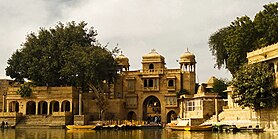 Gadisar Lake Gadisar Lake | |
| Nickname(s): The Golden City, Swarna Nagari | |
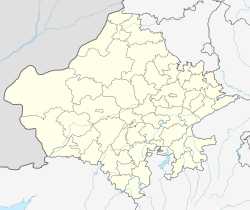   | |
| Coordinates: 26°54′47″N 70°54′54″E / 26.913°N 70.915°E / 26.913; 70.915 | |
| Country | |
| State | |
| District | Jaisalmer |
| Established | 1156; 868 years ago (1156) |
| Founded by | Rawal Jaisal |
| Named for | Rawal Jaisal |
| Government | |
| • Type | Municipal Council |
| • Body | Jaisalmer Municipal Council |
| Area | |
| • Urban | 62.38 km (24.09 sq mi) |
| Elevation | 225 m (738 ft) |
| Population | |
| • City | 65,471 |
| Languages | |
| • Official | Hindi |
| • Additional official | English |
| • Regional | Marwari, Rajasthani |
| Time zone | UTC+5:30 (IST) |
| PIN | 345 001 |
| Telephone code | 02992 |
| ISO 3166 code | RJ-IN |
| Vehicle registration | RJ-15 |
| Website | Jaisalmer Municipal Council Jaisalmer District |
Jaisalmer (pronunciation), nicknamed The Golden city, is a city in the north-western Indian state of Rajasthan, located 575 kilometres (357 mi) west of the state capital Jaipur, in the heart of the Thar Desert. It serves as the administrative headquarters of Jaisalmer district. It is a former medieval trading center and the historic capital of the kingdom of Jaisalmer, founded in 1156 by Rawal Jaisal of the Bhati clan of Rajputs. Jaisalmer stands on a ridge of yellowish sandstone and is crowned by the World Heritage Site, Jaisalmer Fort, a sprawling hilltop citadel supported by 99 bastions. This fort contains a royal palace and several ornate Jain temples. Many of the houses and temples of both the fort and of the town below are built of finely sculptured yellow sandstone. The town has a population, including the residents of the fort, of about 78,000. Jaisalmer ranked 9th on Booking.com's Top 10 The Most Welcoming cities in the world. It is the only Indian city on the list.
Etymology
Jaisalmer was founded by Jaisal Singh, popularly known as Rawal Jaisal, in 1156 AD. It is named after its founder, with "Jaisal" representing the king's name and "Mer" signifying a fort. So, it means "The Fort of Jaisal", emphasising the city's historic fortification and its royal heritage. The term "Mer" or "Meru" is of Sanskrit origin, signifying a mountain or a high, prominent place, and it has been historically used in the names of various geographical features and landmarks, like Ajmer.
History
Main articles: Jaisalmer State and History of JaisalmerMedieval history
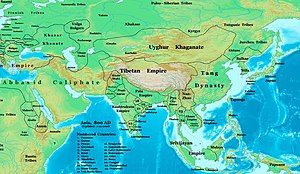
The state of Jaisalmer had its foundations in what remains of the Empire ruled by the Bhati dynasty. Early Bhati rulers ruled over large empire stretching from Ghazni in modern-day Afghanistan to Sialkot, Lahore and Rawalpindi in modern-day Pakistan to Bhatinda, Muktsar and Hanumangarh in modern-day India. The empire crumbled over time because of continuous invasions from Central Asia. According to Satish Chandra, the Hindu Shahis of Afghanistan made an alliance with the Bhati rulers of Multhan, because they wanted to end the slave raids made by the Turkic ruler of Ghazni, however the alliance was defeated by Alp Tigin in 977 CE. Bhati dominions continued to be shifted towards the South as they ruled Multan, then finally got pushed into Cholistan and Jaisalmer where Rawal Devaraja built Dera Rawal / Derawar. Jaisalmer was the new capital founded in 1156 by Rawal Jaisal and the state took its name from the capital.

Modern history
On 11 December 1818 Jaisalmer became a British protectorate in the Rajputana Agency.
Traditionally, in the Middle Ages, the main source of income for the kingdom was levies on caravans, but the economy was heavily affected when Bombay emerged as a major port and sea trade replaced the traditional land routes. Ranjit Singh and Bairi Sal Singh attempted to turn around the economic decline but the dramatic reduction in trade impoverished the kingdom. A severe drought and the resulting famine from 1895 to 1900, during the reign of Salivahan Singh, only made matters worse by causing widespread loss of the livestock that the increasingly agriculturally based kingdom relied upon.
The attempts of Jawahir Singh (1914–1949) at modernisation were also not entirely successful in turning the kingdom's economy around, and the drylands of Jaisalmer remained backward compared with other regions of Rajputana, especially the neighbouring state of Jodhpur. Nonetheless, the extensive water storage and supply, sanitation, and health infrastructures developed in the 1930s by the prime minister Brijmohan Nath Zutshi provided significant relief during the severe droughts of 1941 and 1951. During 1930–1947, Jawahir Singh and his ministers also promoted technical education and the academic disciplines of civil and mechanical engineering in the state.
After the departure of the British from India in 1947, Jawahir Singh signed an Instrument of Accession to the new Union of India, while retaining some internal autonomy until the 1950s.
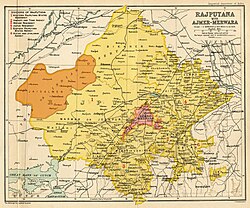

Geography

Climate
Jaisalmer, being an arid desert region, is prone to extremes in terms of temperature. It borders on a hot semi arid climate. The temperature varies greatly from day to night in both summer and winter. The maximum summer temperature is around 40 °C (104 °F) while the minimum is 25 °C (77 °F). The maximum winter temperature is usually around 23.6 °C (74.5 °F) and the minimum is −5 °C (23 °F). The average rainfall is 256.5 millimetres (10.10 in). The highest ever recorded temperature was 50.0 °C (122.0 °F); the lowest ever recorded temperature being −5.9 °C (21.4 °F). Temperatures of up to 52.4 °C (126.3 °F) have been recorded near the Pakistani border, but the standard conditions of this temperature recording remain unverified.
| Climate data for Jaisalmer (1991–2020, extremes 1948–present) | |||||||||||||
|---|---|---|---|---|---|---|---|---|---|---|---|---|---|
| Month | Jan | Feb | Mar | Apr | May | Jun | Jul | Aug | Sep | Oct | Nov | Dec | Year |
| Record high °C (°F) | 35.8 (96.4) |
37.8 (100.0) |
42.7 (108.9) |
45.8 (114.4) |
49.0 (120.2) |
49.2 (120.6) |
47.1 (116.8) |
43.3 (109.9) |
43.5 (110.3) |
42.2 (108.0) |
38.7 (101.7) |
34.4 (93.9) |
49.2 (120.6) |
| Mean daily maximum °C (°F) | 23.4 (74.1) |
27.3 (81.1) |
33.4 (92.1) |
38.9 (102.0) |
42.1 (107.8) |
41.1 (106.0) |
38.4 (101.1) |
36.6 (97.9) |
36.9 (98.4) |
36.4 (97.5) |
31.2 (88.2) |
25.8 (78.4) |
34.4 (93.9) |
| Daily mean °C (°F) | 16.4 (61.5) |
20.5 (68.9) |
26.3 (79.3) |
31.1 (88.0) |
34.8 (94.6) |
34.5 (94.1) |
32.7 (90.9) |
31.3 (88.3) |
31.1 (88.0) |
29.4 (84.9) |
23.9 (75.0) |
18.4 (65.1) |
27.5 (81.6) |
| Mean daily minimum °C (°F) | 9.3 (48.7) |
12.5 (54.5) |
18.4 (65.1) |
23.6 (74.5) |
26.5 (79.7) |
27.6 (81.7) |
27.1 (80.8) |
25.9 (78.6) |
25.0 (77.0) |
22.0 (71.6) |
16.2 (61.2) |
11.0 (51.8) |
20.6 (69.1) |
| Record low °C (°F) | −5.9 (21.4) |
−4.4 (24.1) |
3.4 (38.1) |
10.6 (51.1) |
15.1 (59.2) |
18.8 (65.8) |
20.1 (68.2) |
19.1 (66.4) |
12.9 (55.2) |
8.3 (46.9) |
2.0 (35.6) |
−0.6 (30.9) |
−5.9 (21.4) |
| Average rainfall mm (inches) | 2.5 (0.10) |
4.5 (0.18) |
5.4 (0.21) |
6.6 (0.26) |
14.5 (0.57) |
36.2 (1.43) |
63.9 (2.52) |
79.8 (3.14) |
32.9 (1.30) |
4.7 (0.19) |
0.7 (0.03) |
2.2 (0.09) |
256.9 (10.11) |
| Average rainy days | 0.4 | 0.5 | 0.6 | 0.5 | 0.9 | 1.0 | 3.5 | 3.2 | 1.8 | 0.4 | 0.1 | 0.2 | 13.1 |
| Average relative humidity (%) (at 17:30 IST) | 32 | 27 | 23 | 20 | 21 | 31 | 45 | 50 | 41 | 27 | 28 | 31 | 31 |
| Average dew point °C (°F) | 7 (45) |
10 (50) |
13 (55) |
14 (57) |
17 (63) |
22 (72) |
24 (75) |
24 (75) |
23 (73) |
18 (64) |
13 (55) |
9 (48) |
16 (61) |
| Average ultraviolet index | 5 | 6 | 8 | 8 | 9 | 8 | 8 | 8 | 8 | 7 | 6 | 4 | 7 |
| Source 1: India Meteorological Department Time and Date (dewpoints, 2005–2015) | |||||||||||||
| Source 2: Tokyo Climate Center (mean temperatures 1991–2020), Weather Atlas | |||||||||||||
Demographics
| Religions in Jaisalmer City (2011) | ||||
|---|---|---|---|---|
| Religion | Percent | |||
| Hinduism | 89.93% | |||
| Islam | 8.20% | |||
| Sikhism | 0.54% | |||
| Christianity | 0.50% | |||
| Jainism | 0.46% | |||
| Buddhism | 0.07% | |||
According to the 2011 census, Jaisalmer had a population of 65,471. Around 90% of the population is Hindu, 8.20% is Muslim and the remaining are Sikhs, Christians, and Jains.
Economy
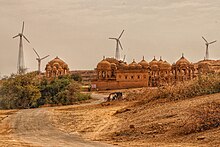
Tourism is a major industry in Jaisalmer.
In recent years, there has been a growing focus on renewable energy in the region. Jaisalmer has been home to various wind and solar energy projects, taking advantage of the ample sunlight and wind resources in the desert.
The Government of India initiated departmental exploration for oil in 1955–56 in the Jaisalmer area. Oil India Limited discovered natural gas in 1988 in the Jaisalmer basin.
Musicians and dancers are also a major cultural export from Jaisalmer to the rest of the world. Manganiyar musicians have played the world over, and Queen Harish, the dancing desert drag queen, has toured the world over and has featured in international movies.
Jaisalmer is also known for its leather messenger bags, made from wild camels native to the area.
Culture/Cityscape
Jaisalmer Fort
Main article: Jaisalmer Fort
Built in 1156 by the Bhati Rajput ruler Jaisal, Jaisalmer Fort, situated on Meru Hill and named as Trikoot Garh has been the scene of many battles. Its massive sandstone walls are a pale yellow colour during the day, turning to a darker gold as the sun sets. The famous Indian film director Satyajit Ray wrote a detective novel and later turned it into a film − Sonar Kella (The Golden Fortress) which was based on this fort. About a quarter of city's population still live inside the fort. The main attractions inside the fort are the Raj Mahal (Royal palace), Jain temples and the Laxminath temple.
Jain heritage
A number of ornate buildings in Jaisalmer were built by its Jain community, including temples, notably the temples dedicated to the 16th Tirthankara, Shantinath, and 23rd Tirthankara, Parshvanath.
There are seven Jain temples in total which are situated within the Jaisalmer fort built during the 12th and 15th centuries. Among these temples, the biggest is the Paraswanath Temple; the others are Chandraprabhu temple, Rishabdev temple, Shitalnath Temple, Kunthunath Temple, and Shantinath Temple. Known for their exquisite work of art and architecture that was predominant in the medieval era the temples are built out of yellow sandstone and have intricate engravings on them.
Jaisalmer has some of the oldest libraries of India which contain the rarest of the manuscripts and artefacts of Jain tradition. There are many pilgrimage centres around Jaisalmer such as Lodhurva Jain temple (Lodarva), Amarsagar, Brahmsar and Pokharan.
-
Chandraprabhu Jain Temple inside the Jaisalmer Fort
-
 Jain Temple inside the Jaisalmer Fort
Jain Temple inside the Jaisalmer Fort
-
Ceiling of Jain temple inside the Jaisalmer Fort
-
 Carving on the wall of Jain Temple, Jaisalmer Fort
Carving on the wall of Jain Temple, Jaisalmer Fort
-
 Jain Haveli architecture
Jain Haveli architecture
-
 Lodhurva Jain temple
Lodhurva Jain temple
-
 Parshvantha, Lodhruva Jain Temple
Parshvantha, Lodhruva Jain Temple
Other

- Gadisar Lake – Excavated in 1367 by Rawal Gadsi Singh, it is a scenic rainwater lake surrounded by the small temples and shrines of Amar Sagar. Earlier, this lake was used to be the main water source of Jaisalmer. Due to an increased water demand for agriculture, the lake is increasingly threatened with drying up.
- Bada Bagh, a complex with chhatris of Jai Singh II (d. 1743) and subsequent Maharajas of Jaisalmer

Bada Bagh (Royal Family Cenetophs)
In the neighbourhood
- Jaisalmer War Museum, a solemn tribute to the nation's military heritage and the sacrifices of its soldiers.
- Kuldhara, a ghost village near Jaisalmer

- Tanot Mata, a historical temple near Indo-Pak border.
- Ramdevra, a village in Jaisalmer, is named after Baba Ramdevji, a Tanwar Rajput and a saint who took Samādhi in 1384 CE, at the age of 33 years. He is worshiped today by many social groups of India as Ishta-deva.
- Battle of Longewala point
- Desert National Park
- Lodhruva
- Rajkumari Ratnavati Girls School
- Moolchand Ji Ki Prol is an ancient heritage site in Jhinjhinyali village. Jhinjhinyali is 100 km away from Jaisalmer district headquarters.
Museums
- Thar Heritage Museum
- Baa RI Haveli On Fort
- Desert Culture Centre & Museum
- Jaisalmer Folklore Museum
- Government Museum
- Jaisalmer Fort Palace Museum
- Akal Fossil Park Museum
- Cactus Park Museum, Kuldhara
- Tanot Museum
Desert festival

Desert Festival of Jaisalmer is the most awaited and famous cultural and colourful event of Rajasthan. Camel races, Turban-tying and Mr. Desert competitions are organised. It is held in the month of February every year. The festival showcases Rajasthani folk songs and dance and it is very attractive to foreign tourists. Gair and Fire dancers which are the major attraction of the Jaisalmer desert festival celebrations. This is the best time to visit Jaisalmer to witness performing arts like Kalbelia dances and folk songs and music.
Transport
Show zoomed outShow zoomed midShow zoomed inJaisalmer is connected to the rest of Rajasthan by buses provided by Rajasthan State Transport Corporation as well as other private bus operators.
Jaisalmer Airport is located 17 kilometres southeast of Jaisalmer. Flights serve Mumbai, Delhi, Bangalore, Jaipur, Ahmedabad, Surat and Jodhpur.

Jaisalmer railway station runs daily trains between Jaisalmer and Jaipur, through which it is connected to Delhi and other cities all over India. This station comes under Jodhpur (JU) division of the Northwestern Railway (NWR). Additionally, there exists a luxury tourist train known as Palace on Wheels, which covers the major tourist destinations of Rajasthan, including Jaisalmer.

In popular culture
- Gupi Gayen Bagha Bayen (1969), a Bengali film directed by Satyajit Ray, was partly shot at Jaisalmer Fort.
- Sonar Kella (1974), Satyajit Ray's Bengali film, based on his eponymous novel featuring his creation, the detective Feluda, was based in Jaisalmer and surrounding areas.
- Hothat Brishti (1998), a Bengali film, was shot in Jaisalmer.
- Nanhe Jaisalmer (2007), Hindi film shot in Jaisalmer
- Goray Gondogol (2012), a Bengali film, was partly shot in Jaisalmer.
- Kishore Kumar Junior (2018), a Bengali film, was partly shot in Jaisalmer.
- The Eken: Ruddhaswas Rajasthan (2023), Bengali movie directed by Joydip Mukherjee and based on Ekenbabu, a detective of Kolkata Police, written by New Jersey–based Bengali author Sujan Dasgupta.
Notable people
- Multanaram Barupal, politician, advocate and former member of Rajasthan Legislative Assembly from Jaisalmer constituency
- Chhotu Singh Bhati, politician and member of Rajasthan Legislative Assembly from Jaisalmer constituency
- Queen Harish, folk dancer
- Mame Khan, Rajasthani folk singer
- Swaroop Khan, playback folk singer
- Raseshwari Rajya Laxmi, queen of Jaisalmer
- Rajyavardhan Singh Rathore, politician, Olympic medallist and retired colonel in the Indian Army
- Rooparam, politician and former member of Rajasthan Legislative Assembly from Jaisalmer constituency
- Gajendra Singh Shekhawat, politician and union cabinet minister in the Ministry of Jal Shakti
See also
- Paramara, Dalvi-Deshmukh of Nasik originating from Jaisalmer
- Pokhran
- Indira Gandhi Canal
References
- "Tourists throng golden city of Jaisalmer for New Year's celebrations". ANI News. 1 January 2023. Retrieved 8 August 2023.
- "स्वर्ण नगरी जैसलमेर में हुआ मरु महोत्सव का आगाज". Zee News (in Hindi). 7 February 2020. Retrieved 8 August 2023.
- "Jaisalmer Municipal Council". Government of Rajasthan. 10 June 2024.
- "District Census Handbook – Jaisalmer" (PDF). censusindia.gov.in. Retrieved 11 February 2021.
See page 24 'Jaisalmer (M) – 62.38', the '38,401' figure is for the 'Jaisalmer – District Total'
- ^ "52nd Report of the Commissioner for Linguistic Minorities in India" (PDF). nclm.nic.in. Ministry of Minority Affairs. pp. 34–35. Archived from the original (PDF) on 25 May 2017. Retrieved 22 May 2022.
- "Of living forts, desert sunrise and haunted village A visit to the golden city of India". The Business Standard. 17 August 2023. Retrieved 23 November 2024.
- "Jaisalmer" . Encyclopædia Britannica. Vol. 15 (11th ed.). 1911. p. 129.
- Ramadurai, Charukesi (29 May 2019). "A Unesco castle where families live rent-free". BBC. Retrieved 24 November 2024.
- "This Indian City Is Among The Top 10 Most Welcoming Cities On Earth". TimesNow. 30 January 2024. Retrieved 1 February 2024.
- "This Indian Gem Is Among The World's Most Welcoming Cities In 2024". Travel and Leisure Asia | India. 1 February 2024. Retrieved 1 February 2024.
- Sehgal, K.K. Rajasthan , p. 1, at Google Books
- Balfour, Edward (1885). The encyclopædia of India and of Eastern and Southern Asia. Original from Oxford University: B. Quaritch. p. 406.
- "Meru". Sanskrit Dictionary.
- Bühler, G. (1897). "The Origin of the town of Ajmer and of its name". Wiener Zeitschrift für die Kunde des Morgenlandes. 11: 51–56. ISSN 0084-0076. JSTOR 23860911.
- "Rajasthan or the Central and Western Rajpoot States, Volume 2, page 197-198". Higginbotham And Co. Madras. 14 August 2018.
- "Imperial Gazetter of India, Volume 21, page 272 – Imperial Gazetteer of India – Digital South Asia Library". Dsal.uchicago.edu. 18 February 2013. Retrieved 22 November 2013.
- "Bhatinda Government: District at A glance- Origin". Bhatinda Government. 14 August 2018. Archived from the original on 10 January 2011. Retrieved 14 August 2018.
- Medieval India 1206–1526 part one, pg.17 by Satish Chandra
- ^ "Provincial Gazetteers Of India: Rajputana". Government of India. 14 August 2018.
- Princely States of India
- "India Meteorological Department – Weather Information for Jaisalmer". Worldweather.wmo.int. Retrieved 12 October 2012.
- "Border areas in Jaisalmer boil at 50°C, no respite in city". The Times of India. 27 May 2010.
- "JAISALMER". Archived from the original on 26 December 2009. Retrieved 23 December 2009.
- Singh, Anuradha (2 May 2016). "Blistering Heat Wave Continues Across India; Jaisalmer Swelters At 52.4 Degrees". Topyaps.com. Archived from the original on 3 May 2016. Retrieved 5 August 2016.
- "Climatological Tables of Observatories in India 1991-2020" (PDF). India Meteorological Department. Retrieved 8 April 2024.
- "Station: Jaisalmer Climatological Table 1981–2010" (PDF). Climatological Normals 1981–2010. India Meteorological Department. January 2015. pp. 345–346. Archived from the original (PDF) on 5 February 2020. Retrieved 20 January 2021.
- "Extremes of Temperature & Rainfall for Indian Stations (Up to 2012)" (PDF). India Meteorological Department. December 2016. p. M181. Archived from the original (PDF) on 5 February 2020. Retrieved 20 January 2021.
- "Climate & Weather Averages in Jaisalmer, Rajasthan, India". Time and Date. Retrieved 20 July 2022.
- "Normals Data: Jaisalmer – India Latitude: 26.90°N Longitude: 70.92°E Height: 231 (m)". Japan Meteorological Agency. Retrieved 1 December 2022.
- "Climate and monthly weather forecast Jaisalmer, India". Weather Atlas. Retrieved 13 June 2022.
- "2nd Five Year Plan". Archived from the original on 14 April 2006. Retrieved 30 March 2006.
- "Rajasthan Exploration Project (RP)". Archived from the original on 30 June 2006. Retrieved 30 January 2021.
- Sandip Roy, Special to The Chronicle (5 July 2008). "Queen H A R I S H". Queen-harish.blogspot.com. Retrieved 19 August 2012.
- "Jaisalmer, Rajasthan – Don't Complain Travel". Dont-complain.com. 6 March 2014. Retrieved 15 September 2018.
- "कृष्ण जन्माष्टमी एवं संत मूलचंद जयंती पर नवनिर्मित प्रोल का उद्घाटन" [Inauguration of newly constructed Prol on Sant Moolchand Jayanti]. Patrika News (in Hindi). 19 August 2022. Retrieved 28 December 2023.
- "1 साल से खटारा हालत में 108 एंबुलेंस: जैसलमेर-बाड़मेर से 100 किलोमीटर की दूरी पर बसे झिनझिनयाली गांव के बाशिंदे परेशान". Dainik Bhaskar (in Hindi). 6 November 2021. Retrieved 16 December 2023.
- "Sonar Qila". Financial Express. 9 January 2004. Retrieved 30 January 2021.
- "Jaisalmer Photos". Archived from the original on 18 December 2012. Retrieved 27 December 2019.
Further reading
- Bhati, Hari Singh. 2002. ANNALS OF JAISALMER: A Pre-Mediaeval History. Kavi Prakashan, Bikaner.
- Gahlot, Sukhvirsingh. 1992. RAJASTHAN: Historical & Cultural. J. S. Gahlot Research Institute, Jodhpur.
- Somani, Ram Vallabh. 1993. History of Rajasthan.
- Tod, James & Crooke, William. 1829. Annals & Antiquities of Rajasthan or the Central and Western Rajput States of India. 3 Vols. Reprint: Low Price Publications, Delhi. 1990. ISBN 81-85395-68-3 (set of 3 vols.)
- Spirit Desert Camp Best Desert Camp in Jaisalmer Visit https://campinjaisalmer.in/
External links
 Jaisalmer travel guide from Wikivoyage
Jaisalmer travel guide from Wikivoyage Geographic data related to Jaisalmer at OpenStreetMap
Geographic data related to Jaisalmer at OpenStreetMap- "Jaisalmer" . Encyclopædia Britannica. Vol. 15 (11th ed.). 1911. p. 129.
| Cities and towns in Jaisalmer district | |
|---|---|
| Jaisalmer | |
| Villages and settlements | |
| Cities and towns in other districts | |